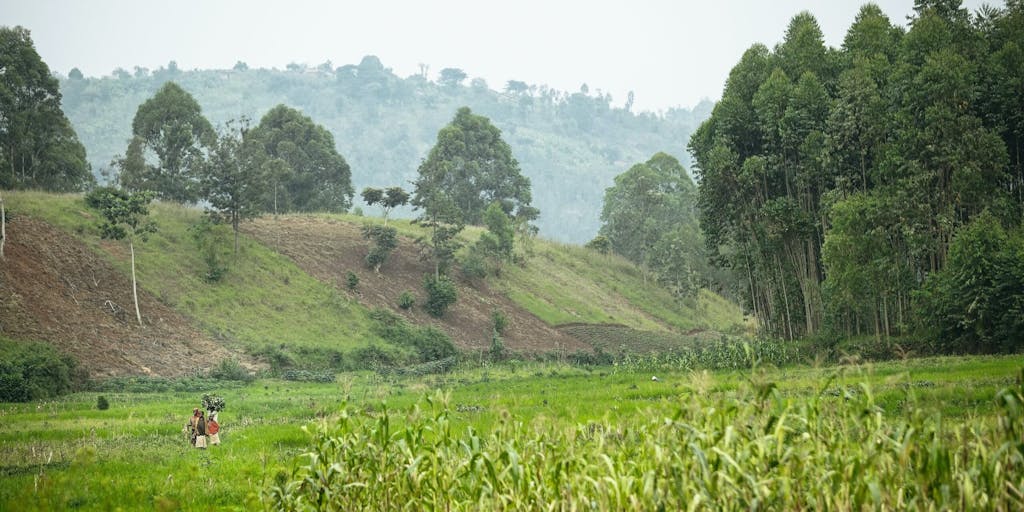This post is the sixth in a series on God’s Story, the Foundation for FH’s Work in Relief and Development. Follow the series, starting with the first post. You can read the next post in the series here.
In the hills of northern Burundi, Joseph and Genesita rely on subsistence agriculture to feed their family. Unfortunately, the land has not always been kind. They have seen years where their harvest did not adequately feed their family, and their children would go hungry.
But today, you would never guess that Joseph and Genesita’s farm had not been productive. Genesita told us, “I am definitely sure that my children will no longer suffer from hunger, and will never miss school again, being left behind while their friends are joyfully going to and coming from school.”
What changed? Food for the Hungry (FH) introduced a program called “Farming God’s Way” to their community, and as a result, the family increased their crop yields by over 900%.
God Has a Way to Farm?

It might seem far-fetched that God would have ideas about how people should farm, but that’s exactly what FH believes. In fact, we are convinced that by looking at God and His Creation, we can discover principles that inform all of our development efforts. In the next few installments of the “God’s Story”, we will discuss these ideas and how we can apply them.
God’s Character Informs Our Work
The earth belongs to God. Psalm 24:1 says, “The earth is the Lord’s, and everything in it, the world, and all who live in it.” (NIV) If we want to understand how the world works, we should certainly first look toward its Owner. Let’s explore three characteristics of God that inform our understanding of transformational development.
1. Glory
God told Moses, “I am who I am” (Exodus 3:14, NIV). God cannot be described better than by referring to Himself. He is completely unique. No one made Him, and He doesn’t require anyone or anything in order to keep existing. In His generous and loving character, God has created us and all that we see out of His own imagination and power in order to share His existence with us. God cares for His creation and made it to reflect His glory.
Why is this important to our work? Anywhere we go, even the most seemingly destitute corner of the world, is part of God’s Creation. In the words of Abraham Kuyper, “There is not a square inch in the whole domain of our human existence over which Christ, who is Sovereign over all, does not cry, ‘Mine!’” God created all people and places with purpose. We have the challenge and privilege of prayerfully discovering His will for any place we are called. We watch for how He is already moving in that community, and then we work alongside them to see His glory revealed.
2. The Trinity
The Bible teaches us that God is one being, but also three persons with distinctive characteristics. This Christian mystery is contained in the theology of the Trinity. God exists in three persons: the Father, the Son (Jesus), and the Holy Spirit. All three of these persons honor and love one another perfectly and sufficiently. At the same time, God’s love in the Trinity overflows and extends to His creation.
Why is this important to our work? The Trinity is the starting point of the concept of community. Like the Trinity, we are made to live in community. This applies to families, churches, villages, and all of humanity. God wants us to promote and live in healthy functional communities. Wherever FH works, we focus on human relationships, which form the backbone of any development.
3. Love and Goodness
Another characteristic of God is that “God is love.” (1 John 4:8, NIV) He is also gracious and compassionate, slow to anger, and abounding in love and faithfulness (Exodus 34:6). God the Father committed history’s most powerful act of love by sending His Son, Jesus Christ, to live among us, die for us, and forgive us.
Why is this important to our work? “We love because He first loved us.” (1 John 4:19) We follow Christ’s example by loving every human being, irrespective of his/her race, sex, age, social condition, or any other difference. Christ’s love also compels us to love the most vulnerable. Jesus always reached out to the needy with compassion and care. What a privilege it is for us to do the same!
Farming Reveals God’s Character

When Joseph and Genesita joined FH’s program on Farming God’s Way, they learned techniques like intercropping, mulching, and applying organic manure. We call it “God’s Way” because we learn from God’s Creation about how to care for the land. We study which techniques result in the highest yields year after year, while replenishing the land for long-term production.
God’s way of looking at the world, based on His character, is even more basic than God’s way of farming the land. Most importantly, by studying His glory, Trinity, love and goodness, we begin to understand how the world was meant to work–and what we can do about it. These ideas form the foundation from which we pursue relief and development.
How does God’s character impact the way you see your own world?
Follow the God’s Story series:
God’s Story: The Story That Matters Most
God’s Story: How Clean Water Reveals the Kingdom of God
God’s Story: Transformation Is Better Than Development


